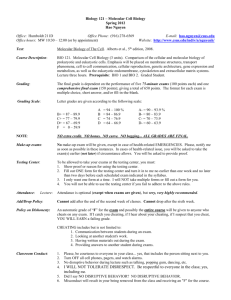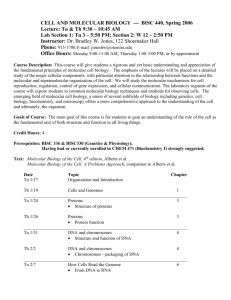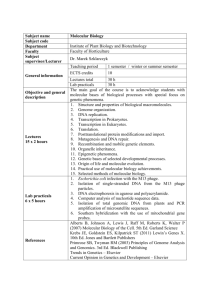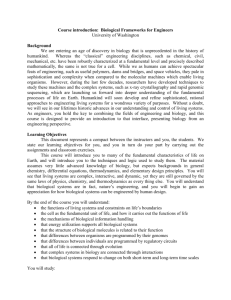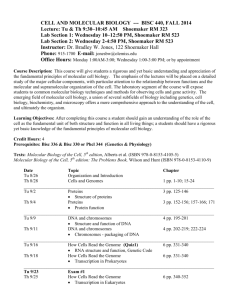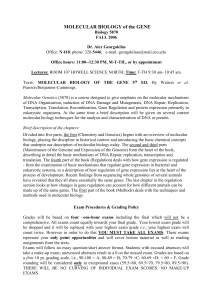Syllabus
advertisement
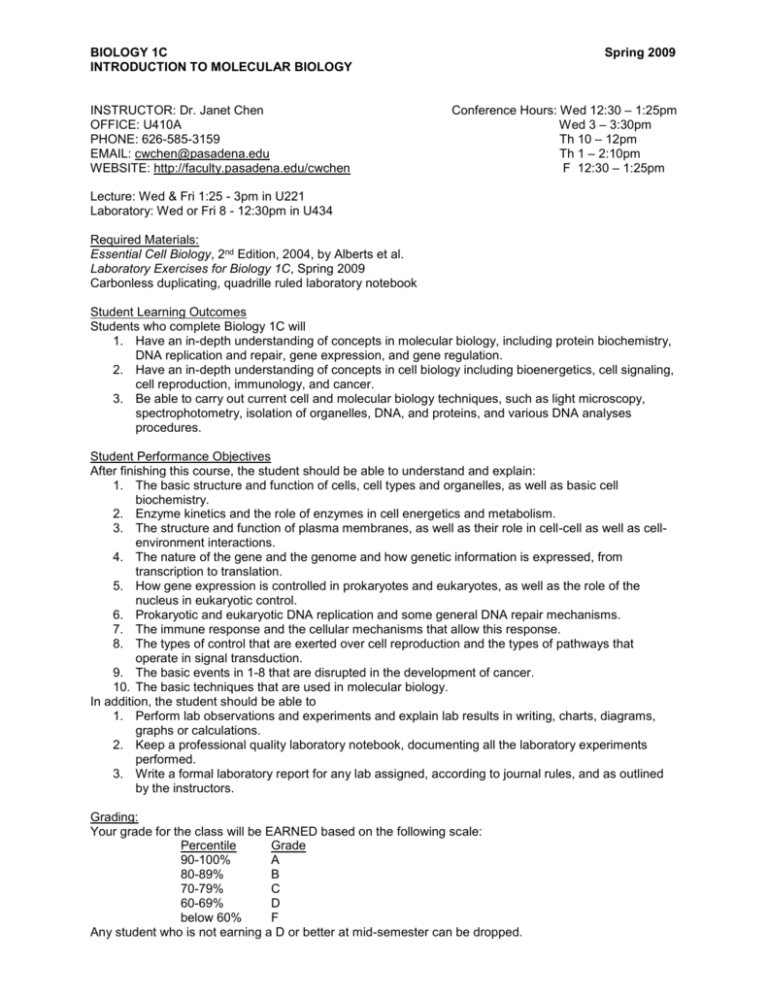
BIOLOGY 1C INTRODUCTION TO MOLECULAR BIOLOGY Spring 2009 INSTRUCTOR: Dr. Janet Chen OFFICE: U410A PHONE: 626-585-3159 EMAIL: cwchen@pasadena.edu WEBSITE: http://faculty.pasadena.edu/cwchen Conference Hours: Wed 12:30 – 1:25pm Wed 3 – 3:30pm Th 10 – 12pm Th 1 – 2:10pm F 12:30 – 1:25pm Lecture: Wed & Fri 1:25 - 3pm in U221 Laboratory: Wed or Fri 8 - 12:30pm in U434 Required Materials: Essential Cell Biology, 2nd Edition, 2004, by Alberts et al. Laboratory Exercises for Biology 1C, Spring 2009 Carbonless duplicating, quadrille ruled laboratory notebook Student Learning Outcomes Students who complete Biology 1C will 1. Have an in-depth understanding of concepts in molecular biology, including protein biochemistry, DNA replication and repair, gene expression, and gene regulation. 2. Have an in-depth understanding of concepts in cell biology including bioenergetics, cell signaling, cell reproduction, immunology, and cancer. 3. Be able to carry out current cell and molecular biology techniques, such as light microscopy, spectrophotometry, isolation of organelles, DNA, and proteins, and various DNA analyses procedures. Student Performance Objectives After finishing this course, the student should be able to understand and explain: 1. The basic structure and function of cells, cell types and organelles, as well as basic cell biochemistry. 2. Enzyme kinetics and the role of enzymes in cell energetics and metabolism. 3. The structure and function of plasma membranes, as well as their role in cell-cell as well as cellenvironment interactions. 4. The nature of the gene and the genome and how genetic information is expressed, from transcription to translation. 5. How gene expression is controlled in prokaryotes and eukaryotes, as well as the role of the nucleus in eukaryotic control. 6. Prokaryotic and eukaryotic DNA replication and some general DNA repair mechanisms. 7. The immune response and the cellular mechanisms that allow this response. 8. The types of control that are exerted over cell reproduction and the types of pathways that operate in signal transduction. 9. The basic events in 1-8 that are disrupted in the development of cancer. 10. The basic techniques that are used in molecular biology. In addition, the student should be able to 1. Perform lab observations and experiments and explain lab results in writing, charts, diagrams, graphs or calculations. 2. Keep a professional quality laboratory notebook, documenting all the laboratory experiments performed. 3. Write a formal laboratory report for any lab assigned, according to journal rules, and as outlined by the instructors. Grading: Your grade for the class will be EARNED based on the following scale: Percentile Grade 90-100% A 80-89% B 70-79% C 60-69% D below 60% F Any student who is not earning a D or better at mid-semester can be dropped. Organization 1. There will be 4 lecture exams, 3 during the semester and a final; each will worth approximately 100 points. 2. There will be 2 lab exams, worth 50 points each. 3. Each exam will consist of short answer and/or multiple-choice questions. Questions will be from reading and lecture and some will ask you to interpret lab results. 4. There will be 1 formal lab report (15 points), unannounced collection of lab duplicates (5 points each), midterm and final lab notebook check (10 points each), unannounced quizzes (covering previous and/or current lecture or lab) at the beginning of class (3-10 points each), and homework assignments (3-10 points each). Late lab reports and homework assignments will be penalized 10% per day late. 5. There will a total of approximately 600 points to be earned. Class Rules and Responsibilities: 1. Read this syllabus thoroughly! 2. Dishonest student conduct is a serious offense. Cheating or the appearance of cheating will result in a zero on the exam or quiz. A repeated offense will result in expulsion from the course with an F on your record. Cheating also includes the use of unauthorized materials, stealing information, changing work to claim a grading error, falsifying data, and plagiarism. 3. You are expected to attend ALL class meetings (lecture and laboratory) and are responsible for announcements made or handouts given during class even if you are absent. 4. Sign attendance sheet during the first five minutes of class. Signing in 10 minutes after class starts is marked as “late”. Three lates = one absence. 5. You may be dropped after two absences (excused or unexcused) from lecture or lab. 6. If you decide to withdraw from the class, it is YOUR responsibility to drop yourself. Otherwise, an F will be assigned for the course. 6. You will earn a zero for a missed exam. No makeup exams will be given except under extreme circumstances (doctor or dental appointments are NOT valid excuses). Such circumstances must be discussed with the instructor prior to or within 24 hours following the exam, and you will be asked to provide written documentation to support your stated situations. If a makeup exam is granted, it will only take place prior to the start of the next class meeting and there will be a 10% penalty per day late regardless of the reason of absence. 7. If you show up late for an exam or quiz, you will not be given any extra time. 8. Use of dictionaries (including electronic translators) will NOT be permitted during exams or quizzes. Only pens, pencils, and erasers are allowed on the desk. Cell phones and all other electronic devices must be turned off and put away out of sight. Book bags, notebooks …etc. must be placed under the lab bench. 9. You may NOT leave the classroom for any reason before you turn in an exam. Make all restroom stops before exam. 10. You may check exams after they have been corrected. No changes will be made for any reason later than 10 days after the date of the exam. 7. Bring a folder or ringed binder for keeping handouts, a ruler, and a scientific calculator to each class meeting. 8. Lab groups will be assigned and posted before the second lab. For reasons of safety and effective learning, communication in lab will be in English only. 9. Please show respect to the instructor and other students by listening attentively while they are talking. Always turn off (or put on silent mode) your cell phones before entering the classroom. Any disruptive behavior such as talking and laughing loudly or use of inappropriate language will not be tolerated. 10. Clean up after yourself at the end of each class meeting. No food is allowed in the classroom. Guidelines for Success in Biology 1C: 1. Always come to class. You are responsible for all information and instructions given in class. Meet a classmate and exchange phone numbers so you can contact him/her if you miss a class. 2. Be prepared. Read the assigned textbook pages and other given materials before coming to class. 3. Stay caught up. Read, reread and review frequently. Study your notes as soon as you can after each class session. Plan to spend AT LEAST 15 hours each week outside of class time studying for this course. 4. Ask questions. Seek assistance early on in the course. 5. Learn from each other. Discuss or study in small groups.
